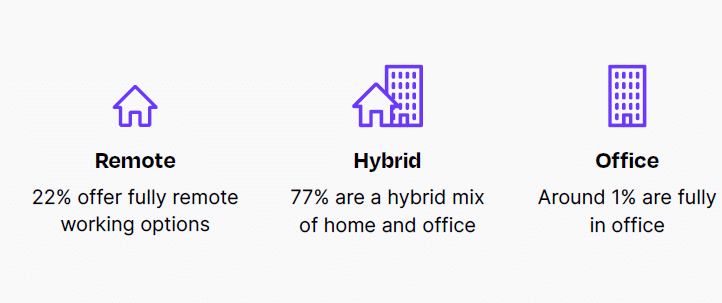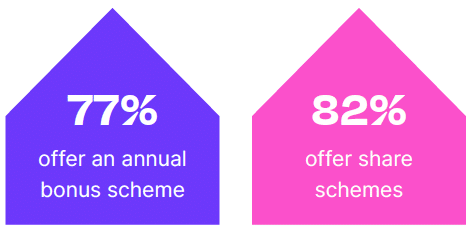This article contains research into company benefits being advertised, as seen through the eyes of candidates. You can use the findings in this research to identify where you can highlight the benefits you offer that other companies might not.
Salary, workplace culture, and development opportunities – they’re all important. But it can be tough for smaller companies to pack a punch in the job market. How can you attract and retain the best people for your startup when you’re competing against big companies with deep pockets? If you haven’t considered the employee benefits your startup should offer, then it’s time to start. Whether you are looking at bringing on your first employee or reviewing your offering for an existing team, nailing your benefits will help you attract and retain the best candidates, and could even entice top performers away from cushty roles with your competitors.
If a candidate in the job market can’t see the benefits you offer, that benefit may as well not exist.
This is a candidate’s eye view of benefits in the job market right now. We’ve trawled through the businesses that are hiring in 2023 to look at the benefits they’re advertising. It’ll give you an idea of what candidates will see when they’re job hunting, what they’ll expect as standard – and what you could do to stand out. Use this guide to benchmark what you offer against the wider industry, and identify what more you could do to set yourself apart from your competitors. And remember, if you’re already doing lots of what’s in this report, you need to say it. Make it obvious in your job ads. If you aren’t doing lots of what’s in this report, identify key areas to focus on.
Prioritise what will make you stand out – then shout about it in your job ads.
What we’ve investigated
We’ve not only gone directly to companies careers pages, but have also combed through popular employer branding platforms—think Glassdoor, LinkedIn, Crunchbase, and more. Our findings are based on an analysis of 130 UK-based companies, and here’s the landscape we cover:
Pay
Benchmark your pay.
Startups and small businesses can’t always compete on salary, but it’s best not to be known for being a low-payer in your industry. Having a pay strategy – like committing to paying in the top 20% of your industry – can help. You don’t have to make that strategy public, but it can be a useful guide when advertising roles. You can buy into a formal industry benchmark or informally look at roles your competitors are listing as a guide. Just 4% of the companies we looked at had any form of public disclosure around pay benchmarking or frameworks.
Pay transparency
It’s always better to include a salary when advertising roles. A recent survey by Reed found that “78% of people said they are less likely to apply for a role when the salary is absent from a job ad”. And remember, when your company grows to over 250 people, you’ll have to report on your gender pay gap, so monitoring this early will put you in a good position for reporting in the future.
While we did not exclusively look through companies that were actively hiring (as some invited speculative applications), our research found only 42% of companies were transparent with the vacancy salaries. Looking on a bigger scale, research from Adzuna found that in the UK, salary transparency has fallen to a 7-year low with just 51.5% of UK job ads disclosing salary in April 2023, down from 61.4% a year ago.
Startups and small companies will often have the added battle of little to no brand recognition from prospective candidates which in turn, creates less trust. Disclosing the salary will help bridge this gap so should be a non-negotiable on any advertised role.
Location
Gone are the days of a 9 -5 Monday to Friday in the office. Candidates want to work flexibly, and the vast majority of hiring businesses are responding to that. Offering some form of remote or hybrid working has fast become the new norm – it’s what candidates will expect. Remote work options for startups should be the default.. just think of those office cost savings! Looking at all the companies in our research;

Pensions
All workplaces must offer a pension scheme but providing enhanced pensions (above the statutory minimum) is a clear gap that not many companies are utilising. Only a third of employers were offering, or seen to be offering, an enhanced pension scheme.
Bonus and share schemes
Bonuses and shares are a tangible way to show your people you value their hard work and loyalty. Having a great scheme that your people buy into can not only help attract talented new starters – it can aid retention by making sure they stick around. Offering a share scheme at a startup isn’t just financial bait on a hook; it’s a way to transform new hires into invested partners who are equally committed to the company’s long-term success.
Bonus and share schemes are becoming the standard, with the majority of companies offering at least one or the other; and often both.

Note on bonus schemes – if you’re going to offer one, go the extra mile and share how it’s calculated and the targets needing to be hit in order to get it. We didn’t come across a single company that does this in our research so it’s a sure-fire way to stand out.
Holiday and leave
Most companies offer more than the minimum annual leave, and a fifth have embraced unlimited leave. Burnout and hustle culture can be a real problem at startups so constructing a leave policy and benefits framework to counter it is a great way to show your people you genuinely care about their wellbeing. Of the companies we looked at;
Health and insurance
The vast majority of companies offer a decent set of healthcare and insurances for their employees. This can be a difficult one for startups to build into their benefits policies as larger companies benefit enormously from the economies of scale that come from having lots of people in the policy. Still, there are options and of the companies we researched;
Important extras
Career development
Personal learning budgets are becoming more common, allowing people to manage their own learning and development.
Community and engagement
Events – company events like town halls, financial updates, and mid-year check-ins are common. These are often hybrid or remote to encourage attendance. 71% of the companies we looked at made reference to at least one of these types.
Awards – publicly recognising and rewarding outstanding contributions. The frequency differs and is usually either monthly, quarterly or annually. 44% of the companies we looked at referenced staff awards and were more often the larger companies.
Retreats – rarer but not unheard of are company holidays to encourage team-building or in recognition of a company-wide achievement. Just 3% of companies had a company wide retreat on offer.
Going the extra mile
Things that are less common but can really make you stand out as an employer…
The four-day work week – It’s a hot topic and a growing feature in the UK. 61 companies took part in the largest ever 4-day week pilot – and an impressive 92% chose to continue on with the set-up once the pilot was over. Productivity hadn’t dipped and employee satisfaction jumped dramatically. We predict more and more companies will opt to reduce working weeks to four days. Despite this, we only came across 2 companies that highlighted they have a 4-day working week.
Work abroad – Allowing your people to work abroad for a set period of time each year. In a hybrid world – why not? This needs to be carefully managed for tax and visa purposes but we only saw 3 companies shouting they encourage their people to work from wherever they want in the world for a certain amount of time each year.
Cycle to work – A scheme that’s simple to set up and allows your people to buy a bike through a small salary sacrifice. Great for the health, wallet, and environment – what’s not to love? 81% of companies offered this perk.
Employee assistance programmes – Confidential services like wellbeing and talk therapies, access to an online GP, financial advice, legal support and family support. 84% of companies made reference to some form of employee assistance.
There were a number of “rare” benefits that we thought stood out, but were offered by only 1 or 2 companies. These included;
The future of this research
This research into employee benefits as seen through the eyes of candidates will be refreshed and added to on a regular basis. We intend to further segment the data into company sizes, industries and locations as we progress. For now, even the broad strokes highlight what you can’t afford not to offer and what you could in the way of employee benefits that others may not be.
We welcome collaboration on this research so please feel free to reach out to luke@talenttent.co.uk if you have any ideas or suggestions for it’s future, or would like to get involved in its collection.